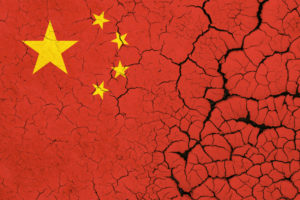In Foreign Policy, Craig Singleton suggests that, rather than being poised to be the next “great competitor” to the United States on the world stage, China is instead no competition at all. He writes:
What if the new era of great-power competition was over before it had even begun? Many of today’s fears about a multigeneration conflict with Beijing rest on linear extrapolations of yesteryear’s data, harkening back to a time when China appeared on track to supplant the United States as the world’s largest economy. Yet more and more signs point to a China that is fully unprepared for the competition with the United States it once sought.
China’s economy, long in decline, is now in freefall—thanks to Chinese leader Xi Jinping’s mismanagement. Case in point: This year, the U.S. economy is forecast to grow faster than China’s for the first time since 1976, with strong indications that China has entered a prolonged era of slow growth. More surprising is that Xi, in an attempt to stabilize China’s finances, has largely abandoned his ambitious plans to overhaul China’s growth model, choosing instead to double down on the very economic policies that got China into today’s economic bind in the first place.
Put differently, Xi blinked.
Xi’s reversal speaks volumes. It suggests he lacks confidence in his own plan to transform China’s unsustainable economic model into one that can deliver on the Chinese Communist Party’s (CCP) promise of “high quality” growth. More important is that China’s fizzling economic miracle may soon undercut the CCP’s ability to wage a sustained struggle for geostrategic dominance.
This raises a tantalizing question: What if, instead of being a competitor, China cannot actually afford to compete at all?
Xi is often said to have tapped into Chinese resentment over its colonial-era humiliations to kick-start its modern-day competition with the United States. But the decision to jettison China’s policy of hiding its capabilities and biding its time began much earlier. Indeed, for decades before Xi’s ascent into power, CCP elites made clear this dictum would be discarded as soon as the international balance of power shifted in China’s favor. When Washington looked to be terminally weakened by the 2008 financial crisis, Chinese officials made their move, betting that overseas investments and economic coercion were the keys to outcompeting the West. They were mostly right.
China’s economic clout, beyond any other consideration, still serves as the foundation for the country’s vast influence. The gravitational pull of China’s market, along with Beijing’s ability to influence economic conditions and shape political perceptions in other countries, enabled China to bind itself to the world. The fruits of China’s economic expansion also underwrote its power projection, covering the costs of the Belt and Road Initiative, military modernization, and expanding multilateral commitments. China’s GDP growth paid domestic dividends for the CCP too, empowering a model of state capitalism that broke down the barriers between the private sector and government institutions to mobilize the former in service of the latter.
Nevertheless, China’s meteoric rise, fueled by annual GDP growth above 6 percent, appears over. Yes, China’s economy has been cooling for years, plagued by systematic deficiencies like chronic overinvestment, massive debt loads, and a shrinking workforce, which has put enormous stresses on China’s finances. But these systematic trends have been exacerbated, perhaps irreversibly, by China’s disastrous pandemic response, where the lack of an effective domestic vaccine and the CCP’s unwillingness to approve and purchase Western ones have made rolling lockdowns a permanent way of life. So far, the CCP’s containment measures have resulted in plummeting industrial output, surging unemployment, capital flight, and a sinking currency.
Read more here.
If you’re willing to fight for Main Street America, click here to sign up for the Richardcyoung.com free weekly email.






